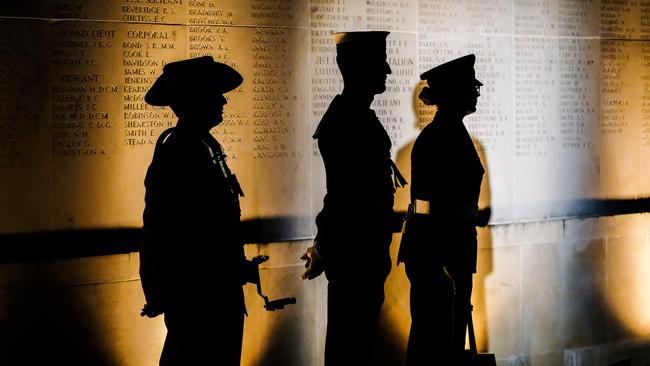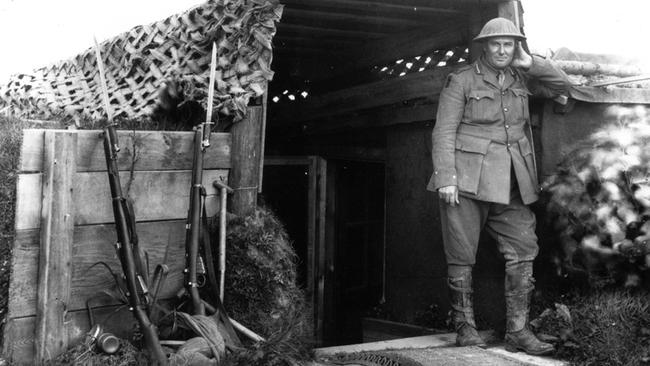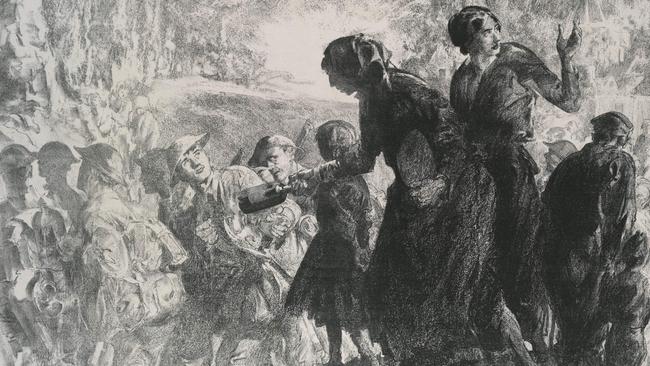H.E ‘Pompey’ Elliott: man of uncommon valour
The story of H.E. ‘Pompey’ Elliott’s bravery is the stuff of legend

A century ago Britain was facing its gravest crisis of World War I. The Germans had launched an immense offensive on March 21, 1918, driving the British back about 65km. In just one day they advanced as far as the British had managed in four months during their 1916 Somme offensive.
Consternation and anxiety were widespread. Some British units had been retiring in disarray. Even the city of Amiens, with its strategically vital railway network, seemed under threat. This was the climax of the most momentous war there had ever been. The commander-in-chief, General Sir Douglas Haig, issued a special order describing the situation as “a crisis”.
After years of colossal casualties that would blight a generation, a grim prospect loomed. Some began to sense that they had to confront the unthinkable. Vera Brittain, who was to become one of the most celebrated memoirists of the era, emphasised in her acclaimed book Testament of Youth “the crushing tension of those extreme days” when “into our minds had crept for the first time the secret, incredible fear that we might lose the War”.
In the crisis Australian Imperial Force formations were rushed to the rescue. Their resilience was striking. Australia has never endured a worse year than 1917, when it had more casualties than any year in this or any other war, and at home the nation was more divided than at any other time.
But the surviving Australian soldiers welcomed their basic objective in the emergency. Instead of more of the dubious and ill-conceived attacks they had too often been directed to undertake, their priority now was to stop the enemy rampaging across Europe, which was why many of them had enlisted in the first place.
As the AIF formations moved towards the oncoming Germans, they were outnumbered by distraught civilians and demoralised British soldiers going the other way. Thousands of despairing women, children and old men were struggling along with various possessions after finding that their homes had become threatened by the rapid German advance.
Some dispirited British soldiers, moving in the same direction, told passing AIF inquirers that the Germans were not far away and advancing in overwhelming numbers. The Australians pressed on nevertheless in the opposite direction, towards the enemy. They were unflustered by the dismay all around them, which boosted their morale by underlining the importance of their task.
Their arrival transformed the mood of the despairing French civilians who recognised these reinforcements as Australians. Some decided to return to the homes they had abandoned because they were confident the Australians would stop the Germans. These were stirring scenes. Some women became emotional. Weeping with joy and relief, they cried “Vive l’Australie!”. An Australian responded with nonchalant reassurance: “Fini retreat madame, beaucoup Australiens ici” (No more retreat madame, many Australians here). An old Frenchman reoccupied his house after leaving it, and explained why: “Pas necessaire maintenant, vous les tiendrez, vous les tiendrez!” A nearby Australian asked someone for a translation, and was told the Frenchman had said “No need to leave now, you’ll hold them, you’ll hold them!” The Australian gave a laconic response: “We’ll have to see the old bloke isn’t disappointed.”
The admirable morale of the Australians, despite the daunting circumstances, was repeatedly commended by observers. Brigadier-General H.E. “Pompey” Elliott’s 15th AIF Brigade was ordered to occupy a succession of areas to bolster the vulnerable British defences. This involved a series of long marches, but Elliott noted on March 26 that “the boys … marched here last night as full of jokes and looking as happy as if they had got leave to Australia”.
Late on March 28, with the situation fluid and precarious, Elliott’s brigade was directed to relocate again, this time to occupy the vacated village of Hedauville. This involved another arduous march, and Elliott had been warned to expect only one hour’s notice of a possible further move to the front line. His men marched through a cold and rainy night, and were weary and wet when they arrived, only to find that Hedauville had not been vacated after all. In fact, the chateau was full of British soldiers.

Pompey Elliott, Australia’s most famous fighting general, spoke to the officer in charge, Lieutenant Bell Smith. It was 9.30am, and Pompey was not impressed that Smith had a languid manner and “was still in very undressed state”. Smith told Elliott that he had received no orders about leaving Hedauville and until he did he could not depart. Elliott replied that his clear orders were to occupy the village, and he could not comply unless Smith’s detachment from the 12th British Division departed; moreover, Pompey added, his men were waiting in sodden fields under persistent drizzle after marching all night. However, he obligingly agreed to leave his men outside until midday to give Smith time to find out where his detachment was to go. Meanwhile, Pompey told his capable intelligence officer, Dave Doyle, to find out what he could about the 12th Division. Doyle’s purposeful roving proved productive.
Pompey had to decide on a temporary location for his headquarters: “I found a ruined schoolhouse with all the windows shattered by shellfire, and with the yard defiled by human excrement. In one corner two British soldiers were dressing a pig they had killed. I remained here wet through until about midday.”
He then returned to the chateau and asked for Smith. Pompey described the ensuing conversation with characteristic frankness:
“He told me that his division had moved, and until he got orders from them as to where he was to go he could not move. I asked him where his division was. He did not know. I asked had he sent (anyone) out to find where it was — No. I then saw that the blighter had no intention to move, that they were very comfortable there and didn’t want to move, and would take mighty fine care they didn’t get orders. So I told him right there and then a few things I had found out about his division and its fighting and running powers, and wound up by informing him that unless he and his officers and men were clear of the village by two o’clock, I would send in an escort of my own men and march them out by force as prisoners. He got a nasty shock, and was out of the village by the time fixed.” A few hours later, as Pompey’s men were settling into their new billets, the situation changed dramatically once again. His brigade was ordered to proceed immediately to the town of Corbie, near Amiens, where they were to come under the command of Major-General John Monash. This would involve another all-night march.
The distance this time was about 30km. With the sense of crisis still acute, an officer at Monash’s headquarters became anxious. “They’ll never get here,” he lamented. Indeed, many of Pompey’s men were so exhausted that they were practically marching in their sleep. But they persevered and arrived at their destination. Pompey Elliott declared that he never felt prouder of them.

However, he was appalled by the extent of British looting he encountered at Corbie. With numerous officers indulging themselves, it was impossible to discipline their men. Pompey issued a notice declaring that the next officer caught looting would be summarily and publicly hanged in the Corbie market square, and his body would be left swinging as a deterrent. Looting ceased immediately. As Pompey (a solicitor in civilian life) observed, “none seemed inclined to make of themselves a test case”.
With the German advance continuing, and Amiens still under threat, Elliott’s brigade and other AIF formations performed superbly in a number of engagements in April. According to Pompey, his 59th Battalion was attacked by no less than three enemy divisions, but German casualties accumulated so quickly that “the survivors of the column concluded that they had urgent business elsewhere”.
Meanwhile he had the Hedauville aftermath to contend with, as Smith had lodged a complaint about the way his 12th Division detachment had been evicted from the village. There was no backward step from Pompey: “In reply I let off some more steam and asked that a court of inquiry should (investigate) the conduct of the British officers and men in the village who had looted the whole place including the chateau. That startled them a bit, and the matter was dropped like a hot spud.”
Within a week Pompey was prominent at Villers-Bretonneux, the tactically vital town that was the key to Amiens. On April 24, with the British safeguarding Villers-Bretonneux, the Germans attacked and captured it. But it was recaptured on the 25th by Pompey Elliott’s brigade and the 13th AIF Brigade in a stunning counter-attack in the dark, with minimal artillery support, that was acclaimed as the finest exploit of the war. After this brilliantly successful envelopment manoeuvre — which was conceived and advocated by Pompey — Villers-Bretonneux was never threatened again, and the enemy thrust towards Amiens was stymied for good.
The Villers-Bretonneux feat was the culmination of the AIF’s significant contribution in the climax of the conflict. Australia’s soldiers were influencing the destiny of the world in 1918 — more than Australians have done in any other year before or since.
What happened at Gallipoli has dominated Australian commemoration of World War I ever since 1915. What happened at the main arena in the climax of the conflict should be much better recognised than it is.
Soon after Villers-Bretonneux three Australian divisional commands became vacant. Pompey Elliott, and his admirers, felt that he had strong claims for promotion in view of his fine record as Australia’s most famous fighting general. But he was overlooked. He felt profoundly aggrieved, and regarded this rejection as an outrageous injustice.
Promotion decisions were made by the British commander of the AIF, General William Birdwood. Pompey Elliott had an argument about his rejection with Birdwood’s able and influential senior staff officer, Major-General Brudenell White. Elliott listed his substantial achievements as a commander — four VCs under his command at Lone Pine, the brilliant success at Villers-Bretonneux, his even more outstanding leadership at Polygon Wood, and much else.
White admitted all that, and even conceded that there was no general braver or more capable in the AIF, but contended that Elliott’s fighting attributes were tarnished by his lack of judgment. When Elliott angrily pressed White to elaborate, the urbane staff officer mentioned a number of controversial episodes involving Elliott during the war, including the Hedauville incident.
It soon became even clearer that the Hedauville controversy had significantly influenced Birdwood. Major-General Talbot Hobbs, Elliott’s immediate superior, visited 15th Brigade headquarters and asked Pompey outside for a private conversation. When they could not be overheard, Hobbs said that he had been directed by Birdwood to reprimand Elliott in the strongest terms for the Hedauville incident, and also to state that he would receive no further promotion because of the way he had treated British officers. Pompey, stunned, reeled away in amazement. Hobbs gave him a consoling pat on the back: “I had to tell you that, but by God you were right,” he added fervently.
For the rest of the war Elliott proceeded to lead his brigade with undiminished vigour. For the rest of his life he remained aggrieved about what he regarded as a monstrous injustice. After the war, soon after his return to Australia, Pompey stood for parliament successfully. At the 1919 federal election he topped the Senate poll in Victoria and, after his initial term in the Senate ended, he was again the first Victorian senator elected at the 1925 election. Elliott was a household name throughout the 1920s, prominent in politics, the law and the history of the war.
In 1931, however, he committed suicide. His intensely felt grievance about being passed over for promotion in 1918 was a factor. He acknowledged this himself: the “injustice of the position as I conceive it has actually coloured all my post-war life”, he admitted.
Ross McMullin is an award-winning historian and biographer whose most recent book is Pompey Elliott at War: In His Own Words. His previous book, Farewell, Dear People: Biographies of Australia’s Lost Generation, was awarded the Prime Minister’s Prize for Australian History.


